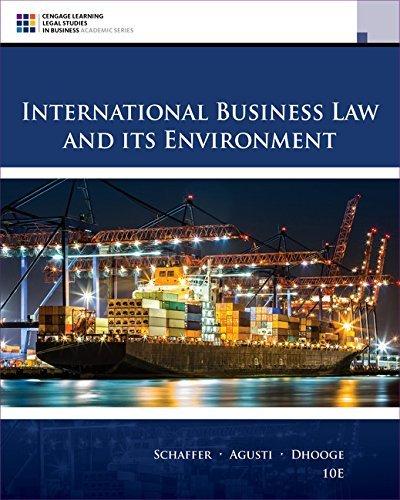We have considered many subjects in this chapter that raise ethical issues-human rights law, international criminal law,
Question:
Exports of "Unsafe" Pharmaceuticals
Some years ago, it was reported in the world's press that American pharmaceutical companies were selling in developing countries expired medicines that were no longer permitted to be sold in the United States. Assess the validity of the following arguments:
There are two sides to every debate. We are talking about antibiotics that are lifesaving and in short supply in some developing countries. True, they are expired under federal regulations in the United States, but they will still be effective for some time to come. It is not illegal overseas, and maybe not illegal to export them, so why should I do anything more than just obey the law? After all, we are selling them at reduced prices to the governments of developing countries. They probably have foreign aid money to buy these with. They will sell them, or give them away, to poor people that otherwise would not be able to afford any medicine at all. Why should I destroy them? After all, we are not talking about AIDS, are we? I wonder what the world and big pharmaceutical companies are doing about that problem?
Bribery as a "Cost of Doing Business"
What are the economic, political, and social arguments for and against criminalizing the bribery of foreign government officials in developing countries by employees and representatives of Western companies? Assess the validity of each of the following arguments in this statement:
I've always thought that bribery is endemic in the developing countries, so 'When in Rome, do as the Romans do.' It's legal there, isn't it? Nothing would happen to me if I get caught there, would it? My government does not have the right to say whether what I do in a foreign country is a crime. They can't tell me what is legal or illegal over there. And I don't have a moral problem, either. I see it as a small price to pay-my company just considers this another 'cost of doing business.' We might even try to deduct it on our corporate income tax returns. If I don't offer cash payments or gifts to my customers in government offices overseas, then my competitors from other countries will. Foreign customers will just buy from my competitors.
If I don't pay, I'd just be giving my competitors a 'corruption advantage.' And what difference does this make anyway? Why should my country care? I've heard about companies that gave cash payments to the Shah of Iran when he was in power in the 1970s, to his government ministers, even to members of his family. They got contracts worth tens and hundreds of millions of dollars to install everything-telecommunications systems, power plants, and refineries, and, most of all, armaments and weapons. I heard he was a brutal dictator, but so what? That's not my problem. I don't see what the problem is.
Fantastic news! We've Found the answer you've been seeking!
Step by Step Answer:
Related Book For 

International Business Law And Its Environment
ISBN: 9781305972599
10th Edition
Authors: Richard Schaffer, Filiberto Agusti, Lucien J. Dhooge
Question Posted:





